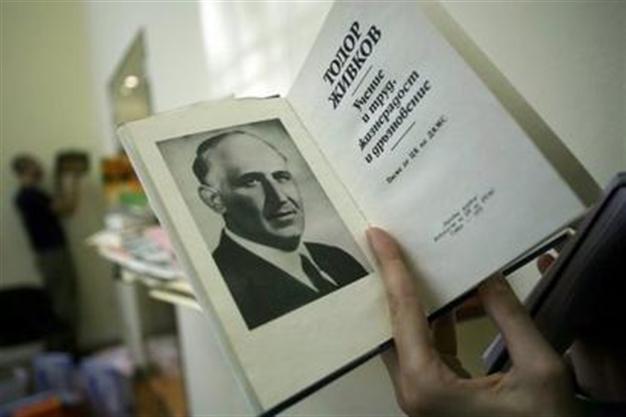Turkish exodus in 1989 was ethnic purge: Bulgarian archives
SOFIA - Agence France-Presse

A book by Bulgarian Communist dictator Todor Zhivkov. AFP photo
The exile of 340,000 ethnic Turks from Bulgaria between June and September 1989 was an ethnic purge and was not voluntary as presented at the time, new documents published Monday showed. "We are on the brink of a massive exodus... which is however necessary and welcome for us," communist dictator Todor Zhivkov told top party officials at the onset of the purge in early July 1989, according to the documents from Bulgaria's ex-communist party.
"If we do not make 200,000-300,000 of these people leave, in 15 years' time Bulgaria will not exist. It will become another Cyprus," he added, referring to the east Mediterranean island's 1974 division into a Turkish north and a Greek-speaking south.
Zhivkov's speech was among 2,459 documents from the communist party's executive committee published Monday on the website of the state archives agency, or www.archives.bg/politburo On May 29, 1989, Bulgaria opened its border with Turkey -- closed until the fall of communism -- to encourage the departure of part of its 10-percent ethnic Turkish minority, considered a fifth column of the enemy NATO member state.
The decision followed a series of protests by ethnic Turks in the northeast who wanted their Muslim names back after they had been changed into Bulgarian ones by the authorities in 1984 and 1985.
"We have ordered the interior ministry to swiftly deport the extremists by force... to massively expel the fanatics who are at the heart of these events," Zhivkov said in the document.
At the same time, the authorities should not hinder the departure of ordinary people and "should present the process as something normal and not hostile," he said. The word "deportation" was not to be used, he added. The exodus sparked fears within the communist party of a labour shortage, especially in the farming, construction and industrial sectors, and soldiers, public officers, students and pensioners were mobilised to make up for the lost workforce, the documents showed. Under Zhivkov's instructions, the houses of those who left were to be bought at symbolic prices and given to ethnic Bulgarians, who were also to take the jobs left vacant.
Some 340,000 people left for Turkey at the time, including 130,000 who later returned to Bulgaria. The campaign, which was not supported by Moscow, sped up Zhivkov's ousting on Novemver 10,1989, after 35 years in power.
Bulgaria's state archives agency is in the process of publishing its entire archive, which spans the whole communist period in Bulgaria from 1944 to 1989.
